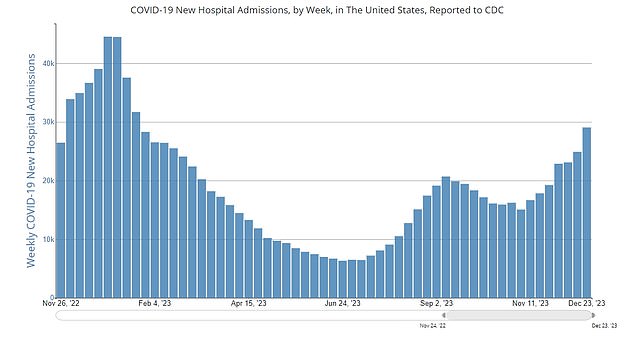Do YOU have the new JN.1 Covid variant? Here’s the unexpected symptoms to watch out for
- Anxiety and sleep problems are now being considered as symptoms for the first time
- Research comes from Britain, where outbreaks foreshadow what's to come for the US
- READ MORE: CDC sounds alarm about new Covid variant JN.1
As a new Covid variant gains speed, scientists are increasingly noticing unexpected disease symptoms, including anxiety and sleep problems.
The omicron offshoot JN.1 is responsible for about 44 percent of Covid cases currently circulating in the US, up from just 21 percent two weeks ago.
And in addition to the well-known symptoms: runny nose, coughing and headache, scientists say two more signs can now be added to the list.
According to new research data collected by health officials in Britain — where the JN.1 strain makes up 10 percent of cases — anxiety and insomnia have only recently become hallmarks of the infection.
Meanwhile, loss of taste or smell, previously considered common symptoms of Covid, are not being reported as often as they used to be.
The characteristics of outbreaks in the UK traditionally provide a glimpse of what will happen in the US.
Feelings of anxiety and sleep problems have not previously been seen as symptoms of an infection. But British health officials are now reporting them as such, amid a new variant gaining speed worldwide

A rise in US hospitalizations in recent months has corresponded with an increased prevalence of the JN.1 subvariant, but hospitalization rates are still much lower than this time last year
Now scientists suggest that anxiety could also be a sign that someone has become infected – but the question remains why.
More than 10 per cent of Britons with Covid have consistently reported anxiety or excessive worry since the start of November, according to the winter Covid report from the Office for National Statistics in the United Kingdom.
JN.1 appeared in Britain in late October, suggesting that a significant proportion of people surveyed from mid-November may have been infected with this subvariant.
Sleep problems are also becoming more common. About nine percent of people reported this as a symptom in November. That share has now risen to almost 11 percent.
British scientists suggested that the most common symptoms of infection with the JN.1 variant were a runny nose, reported by 31 percent of patients, and coughing, in 23 percent, and headache, in 20 percent.
Nearly 20 percent reported weakness and fatigue, and 16 percent reported experiencing muscle pain.
Interestingly, since the start of the pandemic, reports of changing senses of taste and smell have decreased by 42 percent.
But whether a person will experience some or all of these symptoms, including those not previously widely reported, depends largely on each individual's health and immunity to the virus.
According to the CDC, in general, Covid symptoms are “similar across all variants.”
The increasing prevalence of less expected symptoms suggests the virus is getting better at evading people's immune systems. Still, this does not prove that the strain is more virulent and deadly than previous strains.
There are signs that Covid is on the rise. The CDC has listed COVID activity in wastewater as 'very high' – the highest benchmark according to agency statistics.
Meanwhile, daily hospital admissions due to Covid have risen by about 17 percent over the past two weeks.
The new variant was first discovered in the US in September and made up just 0.1 percent of Covid cases in October.
JN.1 is very similar to the previous BA.2.86 variant, with only a single change that mutates in the virus's spike protein.
